Remains of tragic Everest climber Sandy Irvine ‘found’: Foot encased in boot and sock bearing his initials are discovered inside boot – 100 years after he vanished near peak of world’s highest mountain with George Mallory
The partial remains of tragic Mount Everest climber Andrew ‘Sandy’ Irvine are believed to have been found – 100 years after he disappeared.
Irvine disappeared at the age of 22 with his climbing partner, famed mountaineer George Mallory, in June 1924 as they attempted to become the first people to climb the world’s highest peak.
What is believed to be Irvine’s foot, encased in his sock and boot, was found on Everest’s central Rongbuk Glacier, beneath the mountain’s north face and at a lower elevation than where Mallory’s remains were found in 1999.
Incredibly, Irvine’s remains were identified by the name stitched into his sock: AC Irvine. His middle name was Comyn.
Irvine’s family said in a statement that they were “deeply moved” to hear of the discovery.
The partial remains of tragic Mount Everest climber Andrew ‘Sandy’ Irvine are believed to have been found – 100 years after he disappeared. What is believed to be Irvine’s foot, encased in his sock and boot, was found on Everest’s central Rongbuk Glacier, beneath the mountain’s north face. Irvine’s remains were identified by the name stitched into his sock: AC Irvine
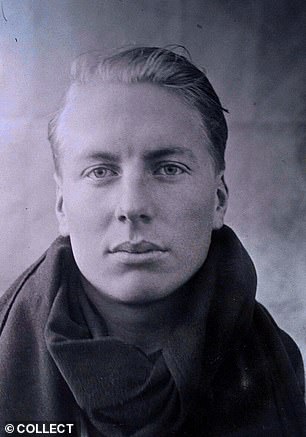
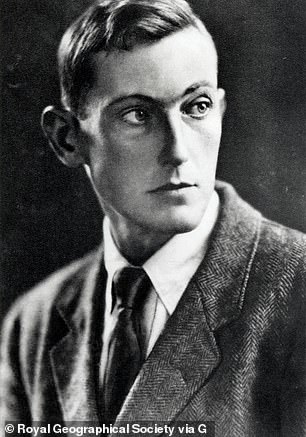
Irvine (left) disappeared at the age of 22 along with his climbing partner, famous mountaineer George Mallory, in June 1924
A small team consisting of Oscar-winning director and climber Jimmy Chin and fellow climbers and filmmakers Erich Roepke and Mark Fisher recently made the discovery: National Geographic announced this today.
The remains are now in the possession of the China Tibet Mountaineering Association, the body that issues permits for climbing the north face of Everest.
The find has been reported to the Royal Geographical Society, the organization that organized Mallory and Irvine’s original expedition along with the Alpine Club.
Irvine’s family, which includes his great-niece and biographer Julie Summers, has volunteered to compare DNA test results with the remains to confirm they are Irvine’s.
Some experts believe the pair may have achieved their goal before they perished, as they were last seen about 800 feet from the summit.
In 2021, author Mark Synnott speculated in his book The Third Pole: Mystery, Obsession, and Death on Mount Everest that Chinese climbers may have found Irvine’s body and camera and then removed the evidence.
Questions will remain about why only Irvine’s foot was found. The whereabouts of the camera are still unknown.
Mallory’s body was found in 1999, wearing hobnail boots, just 600 meters from the summit of Everest.
He had a rope around his waist and injuries consistent with the possibility that he and Irvine might have fallen while tied together.
The pair had a Vest Pocket Kodak camera with them that was never found. If it is all found, it could contain crucial photos proving the men reached the summit of Everest
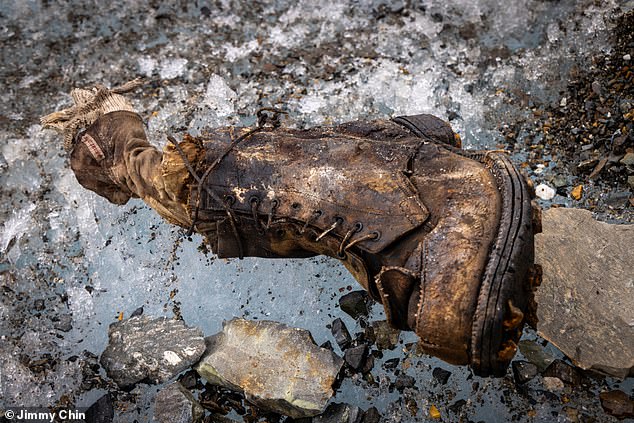
The foot and boot were found on Everest’s central Rongbuk Glacier, beneath the mountain’s north face and at a lower elevation than where Mallory’s remains were found in 1999.
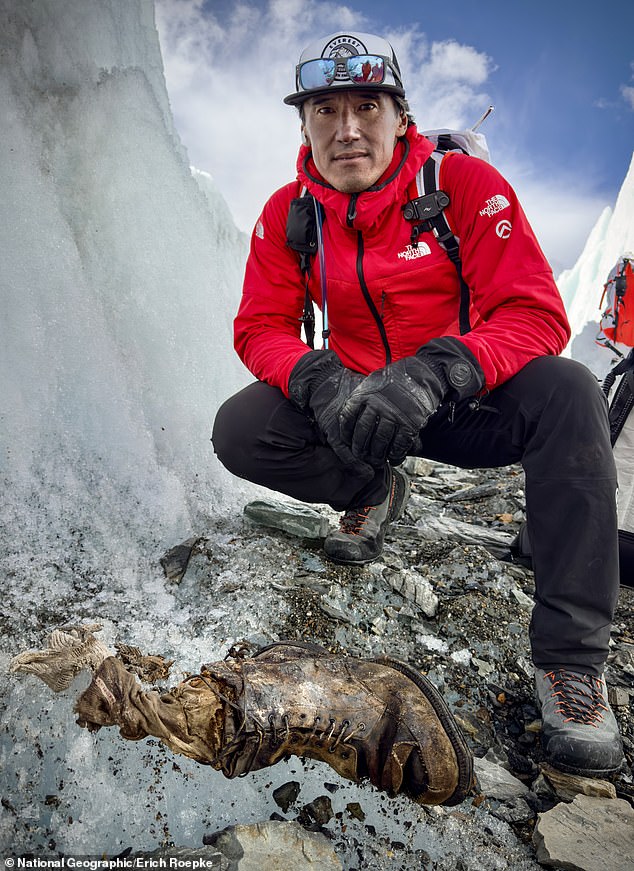
A small team consisting of Oscar-winning director and climber Jimmy Chin and fellow climbers and filmmakers Erich Roepke and Mark Fisher recently made the discovery, National Geographic announced today. Above: Mr Chin with what is believed to be Irvine’s remains
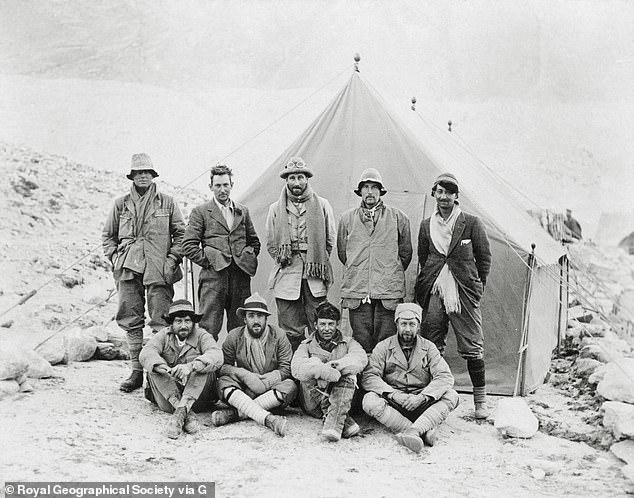
Irvine (top left) and Mallory (top row, second from left) are pictured with the other members of the 1924 Everest expedition
With that evidence lacking, Sir Edmund Hillary and Sherpa Tenzing Norgay are still credited as the first climbers to reach the summit of the Himalayan mountain, which straddles Nepal and China, during their 1953 expedition.
If Mallory and Irvine reached the summit of Everest, they would also have been the first to successfully do so on the deadly North Face, almost forty years before Chinese climbers accomplished the feat in 1960.
A statement from Irvine’s family said: ‘The Irvine family is deeply moved to learn of the discovery of partial remains of Sandy Irvine.
‘We are grateful to the mountaineering and film team, led by Jimmy Chin, who made the discovery and handled it with respect and professionalism.
“We are pleased that the remains are now in the hands of the CTMA.
‘Sandy Irvine was the youngest member of the 1924 Mount Everest expedition and became lost on the upper slopes of the mountain with George Mallory when the two disappeared on June 8, 1924.’
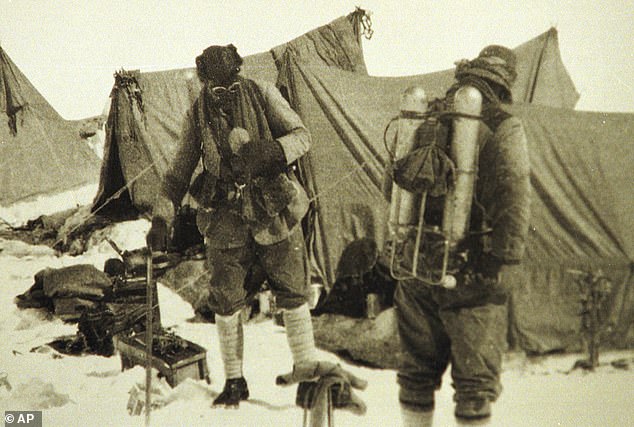
George Mallory is seen with Andrew Irvine at base camp in Nepal
Mrs Summers said: ‘It is remarkable that this discovery was made in the centenary of Sandy’s disappearance.
“I’ve lived with this story since I was seven years old when my father told us about the mystery of Uncle Sandy on Everest.”
She added: “When Jimmy told me he saw the name AC Irvine on the label on the sock inside the boot, I found myself moved to tears. It was and remains a special and poignant moment.’
Mr Chin said: “Every expedition to Everest follows in the shadow of Irvine and Mallory,” Chin said.
‘We certainly did that. And sometimes life’s greatest discoveries happen when you’re not even looking.
“This was a monumental and emotional moment for us and our entire team on site, and we only hope that this can finally bring peace of mind to his family members and the climbing world as a whole.”
Professor Joe Smith, Director of the Royal Geographical Society, said of the discovery: ‘As co-organiser of the 1924 Everest expedition (with the Alpine Club), the Society deeply appreciates the respect shown by Jimmy Chin’s team to the remains of Sandy Irvine and their sensitivity to Sandy Irvine’s remains. Sandy’s relatives and others involved in that expedition.”
He added: ‘This discovery of his remains provides an element of closure for his family members and the wider mountaineering community, and we are grateful to Jimmy and his team for making this possible and ensuring Sandy is in safe hands.
‘The Society will continue to stand by Jimmy, his team and Sandy’s extended family during what will inevitably be a period of intense global interest.’
